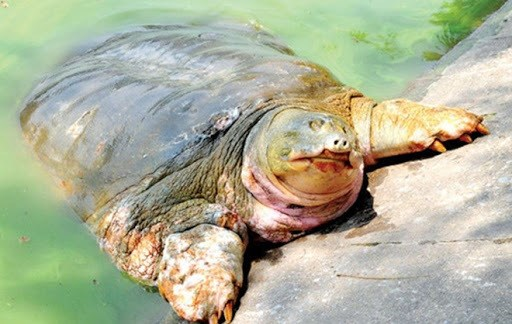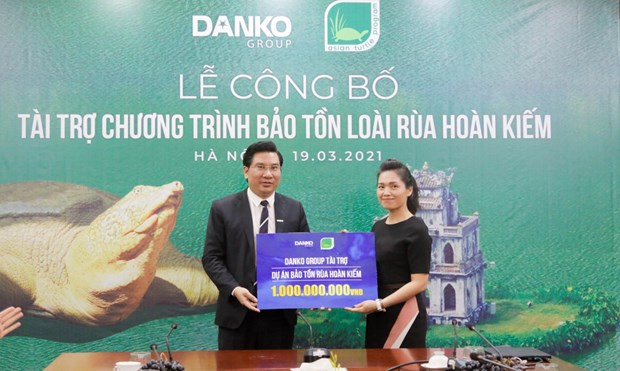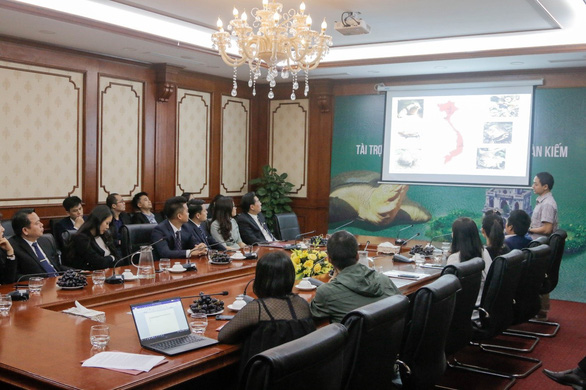 |
| Hoan Kiem turtles (Source: Internet) |
The Hoan Kiem turtle, whose scientific name is the Swinhoe, Rafetus swinhoei, was included in the list of the 100 most rare species on earth in 2012. This is a unique turtle species, only existing in Asia.
The ATP program is implemented by Indo-Myanmar Conservation (IMC) in Asia.
Danko Group, a real estate group, has donated VND 1 billion (over USD 43,000) to the Asian Turtle Programme (ATP) under the Indo-Myanmar Conservation (IMC) to promote the conservation of Hoan Kiem turtles (Rafetus swinhoei) in the world, including those in Vietnam.
In addition to its important conservation significance, the Hoan Kiem turtle has long been associated with the cultural and spiritual life of Hanoi people. This turtle has lived in Hoan Kiem lake for a long period of history, associated with the legend of King Le Loi, after defeating foreign invaders, and returned the precious sword to the Tortoise God. Therefore, the Hoan Kiem turtle is a cultural symbol and pride in the nation’s tradition of protect the country against foreign enemies.
After the giant Hoan Kiem turtle died in Hanoi’s Hoan Kiem Lake in 2016 and the Hoan Kiem turtle in Suzhou Zoo in China died in 2019, the world officially recorded only three individuals, including one male turtle at Suzhou Zoo of China, and two in Vietnam – one in Xuan Khanh Lake and one in Dong Mo Lake in Hanoi.
 |
| Danko Group’s Vice Chairman Dam Quoc Hiep awarded funding for Hoan Kiem Lake turtle conservation program. |
In addition to the significance for conservation, the Hoan Kiem turtle has long been associated with the cultural and spiritual life of Hanoians in particular and the Vietnamese people in general. This species of turtle lived in Hoan Kiem Lake for a long period of history, linked with the legend of national hero Le Loi (1385 – 1433).
ATP has been working to conserve the world’s rarest turtle species. The most important achievement was the discovery and conservation of two Hoan Kiem turtles in Dong Mo and Xuan Khanh lakes.
ATP was established in 1998 and incorporated into the Cleveland Metroparks Zoo/Cleveland Zoological Society’s Asia regional programme in 2003.
Since the ATP originated with the development of the Turtle Conservation Centre (TCC) at Cuc Phuong National Park together with the local non-governmental organisation – Education for Nature Vietnam (ENV), ATP has been working on the conservation of tortoises and freshwater turtles (TFT) in Southeast Asia. Much of its work in the last 20 years has been focused in Vietnam, where, of the 26 confirmed species here, six are listed as Vulnerable, nine are Endangered and seven are Critically Endangered, according to IUCN’s Red List (2019).
 |
| The program inspires the young generation in the conservation of rare animals |
ATP has concentrated its efforts on Vietnam’s priority species including those which are critically endangered or endemic, such as the endemic Vietnamese Pond Turtle (Mauremys annamensis), the Box Turtles of central Vietnam – Cuora bourreti and Cuora picturata, and the legendary Hoan Kiem Turtle (Rafetus swinhoei), also known as Swinhoe’s Softshell Turtle, in northern Vietnam, largely recognised as the most endangered turtle species in the world.
Understanding the value of Hoan Kiem turtle conservation, Danko Group’s donation to the ATP Program of Indo-Myanmar Conservation (IMC) in hope of inspiring and calling for rare species conservation, but also open opportunities for human values in the legend of Hoan Kiem lake in the present and the future. During the implementation of the Hoan Kiem turtle conservation project, Danko Group will also continue to accompany with and support the program.
A leader of Danko Group says that life has so many wonderful things, some things lost and will not be found again. I want my children to live in harmony with nature, with animals, especially to see the Hoan Kiem turtle in reality, not in books. Danko Group’s today small action not only fires a torch of preserving this rare species from the brink of extinction, but also helps “the legend lives forever”.



